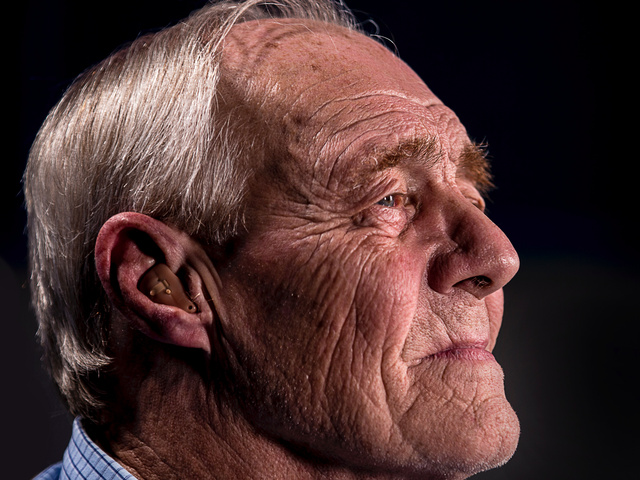Sensory loss
Hearing loss is one of the most common health conditions to affect older adults, and research suggests that it may be linked to experiences of hearing voices.
For example, in a recent Dutch study of more than 800 people with hearing impairments, over 16% reported having had experiences of hearing things that others didn’t within the last four weeks. Almost half of these experiences were experiences of voices, but hearing music, telephones and doorbells ringing were also very common. People without difficulties hearing were much less likely to have these experiences.
The researchers also found that the likelihood of hearing voices and other sounds increased with the severity of the hearing impairment – so, maybe surprisingly, people with worse hearing were more likely to hear things like voices. 24% of participants affected by profound hearing loss reported these experiences.
These findings are important because they suggest that healthcare professionals should routinely ask about hearing loss when people – particularly older adults – report experiences of hearing voices. It could be a contributing factor that is easily treatable.

Hearing loss and musical hallucinations
In his book Hallucinations, Oliver Sacks describes the case of Diane G., an elderly woman who has had
I have had tinnitus as far back as I can remember. It is present almost 24/7 and is very high pitched. It sounds exactly like how cicadas sound when they come in droves back on Long Island in the summer. Sometime in the last year [I also became aware of] the music playing in my head. I kept hearing ‘Bing Crosby, friends and orchestra’ singing ‘White Christmas’ over and over. I thought it was coming from a radio playing in another room until I eliminated all possibilities of outside input. It went on for days, and I quickly discovered that I could not turn it off or vary the volume. But I could vary the lyrics, speed and harmonies with practice. Since that time I get the music almost daily, usually toward evenings and at times so loud that it interferes with my hearing conversations. …
To add to this cacophony, I now have started hearing a third level of sound at the same time that sounds like someone is listening to talk radio or TV in another room. I get a constant running of voices, male and female, complete with realistic pauses, inflections and increases and decreases in volume. I just can’t understand their words.
Hearing loss or deafness is one of the most common causes of musical hallucinations. At least 2% of people with difficulties hearing will have these kinds of experiences.
Action on Hearing Loss
Find out more
Read
Oliver Sacks (2012). Seeing Things? Hearing Things? Many of us do. The New York Times.
This accessible article includes a discussion of sensory decline in elderly people and how it is linked to experiences of seeing visions in Charles Bonnet syndrome, hearing voices and musical hallucinations.
